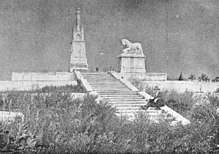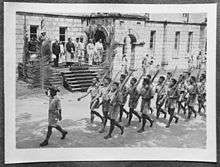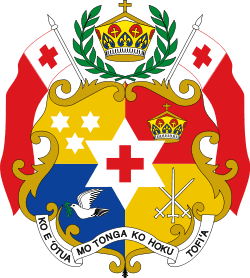Kingdom of Tonga (1900–1970)
From 1900 to 1970, the Kingdom of Tonga was a protected state of the United Kingdom.
Kingdom of Tonga | |||||||||
|---|---|---|---|---|---|---|---|---|---|
| 1900–1970 | |||||||||
.svg.png) Location of the Kingdom of Tonga with present day borders shown. | |||||||||
| Status | Protected state of the United Kingdom | ||||||||
| Capital | Nuku'alofa | ||||||||
| Common languages | English Tongan | ||||||||
| Religion | Free Wesleyan Church | ||||||||
| Government | Constitutional monarchy (British Protectorate) | ||||||||
| Monarch | |||||||||
• 1900–1918 | George Tupou II (first) | ||||||||
• 1965–1970 | Tāufaʻāhau Tupou IV (last) | ||||||||
| Prime Minister | |||||||||
• 1900–1905 | Siosateki Veikune (first) | ||||||||
• 1965–1970 | Fatafehi Tu'ipelehake (last) | ||||||||
| Legislature | Legislative Assembly | ||||||||
| History | |||||||||
• Treaty of Friendship | 18 May 1900 | ||||||||
• End of protection status | 4 June 1970 | ||||||||
| Currency | Tongan pound (1921–1967) Tongan paʻanga (1967–1970) | ||||||||
| ISO 3166 code | TO | ||||||||
| |||||||||
History
Tonga became a British protected state under a Treaty of Friendship on May 18, 1900, when European settlers and rival Tongan chiefs tried to oust the second king. The Treaty of Friendship and protected state status ended in 1970 under arrangements established prior to her death by the third monarch, Queen Sālote.
An unspoken agreement of the treaty that was common in British Protectorate states was a new British monopoly on Tonga's thriving vanilla industry, and their small deposits of minerals.
On 18 May 1900, to discourage German advances,[1] the Kingdom of Tonga became a Protected State with the United Kingdom under a Treaty of Friendship signed by George Tupou II after European settlers and rival Tongan chiefs attempted to overthrow him.[2][3] Foreign affairs of the Kingdom of Tonga were conducted through the British Consul. The United Kingdom had veto power over foreign policies and finances of the Kingdom of Tonga.[4]
Tonga was affected by the 1918 flu pandemic, with 1,800 Tongans killed, around eight per cent of the residents.[5]
For most of the 20th century Tonga was quiet, inward-looking, and somewhat isolated from developments elsewhere in the world. Tonga's complex social structure is essentially broken into three tiers: the king, the nobles, and the commoners. Between the nobles and commoners are Matapule, sometimes called "talking chiefs," who are associated with the king or a noble and who may or may not hold estates. Obligations and responsibilities are reciprocal, and although the nobility are able to extract favors from people living on their estates, they likewise must extend favors to their people. Status and rank play a powerful role in personal relationships, even within families.
On 4 June 1970, protected state status of the Kingdom of Tonga ended. The end of the Kingdom of Tonga protected state status was arraigned by Salote Tupou III prior to her death in 1965.
 Tomb of King George Tupou I, 1900
Tomb of King George Tupou I, 1900.jpg) Tomb of King George Tupou I, 1900
Tomb of King George Tupou I, 1900 King George Tupou II going to the Opening of Tongan Parliament in 1900
King George Tupou II going to the Opening of Tongan Parliament in 1900 Richard Seddon and wife at the opening of the Tongan parliament, 1900
Richard Seddon and wife at the opening of the Tongan parliament, 1900 Royal Throne of Tonga, 1900.
Royal Throne of Tonga, 1900. Monument for the great war 1914—1918 in Nukuʻalofa, Tonga
Monument for the great war 1914—1918 in Nukuʻalofa, Tonga Members of the Tonga Defence Force of 2nd NZEF on parade in Tonga celebrating the capitulation of Italy in 1945
Members of the Tonga Defence Force of 2nd NZEF on parade in Tonga celebrating the capitulation of Italy in 1945 Bishop John Rogers, Pīsila (wife of Fusitu'a) and Suli Seuli (matāpule of Fusitu'a) watching dancing. Inauguration of the Catholic church in Kolofo'ou. 1967
Bishop John Rogers, Pīsila (wife of Fusitu'a) and Suli Seuli (matāpule of Fusitu'a) watching dancing. Inauguration of the Catholic church in Kolofo'ou. 1967
References
- http://www.britannica.com/place/Tonga/History
- http://famousdaily.com/history/tonga-protectorate-uk.html
- http://www.infoplease.com/country/tonga.html
- http://www.britannica.com/place/Tonga/History
- Kohn, George C. (2008). Encyclopedia of plague and pestilence: from ancient times to the present. Infobase Publishing. p. 363. ISBN 0-8160-6935-2.

